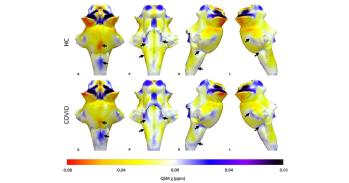
Molnupiravir, an antiviral drug used to treat patients with COVID-19, appears to be driving SARS-CoV-2 to mutate and evolve, with some of these new viruses being transmitted onwards, a new study has shown. It is not clear, however, whether these mutated viruses pose an increased risk to patients or are able to evade the vaccine.
Molnupiravir, an antiviral drug used to treat patients with COVID-19, appears to be driving SARS-CoV-2 to mutate and evolve, with some of these new viruses being transmitted onwards, a new study has shown. It is not clear, however, whether these mutated viruses pose an increased risk to patients or are able to evade the vaccine.
Molnupiravir belongs to a class of drugs that can cause the virus to mutate so much that it is fatally weakened. But what we’ve found is that in some patients, this process doesn’t kill all the viruses
Christopher Ruis
The drug works by disrupting the virus’s genome, causing it to develop random mutations as it replicates, weakening the virus to prevent replication, thereby enabling clearance of infection.
But in research published today in Nature, scientists have shown that in some cases, mutated forms of the virus have been able to be transmitted from patients treated with molnupiravir and spread within the community.
Dr Christopher Ruis from the Department of Medicine at the University of Cambridge said: “Molnupiravir is one of a number of drugs being used to fight COVID-19. It belongs to a class of drugs that can cause the virus to mutate so much that it is fatally weakened. But what we’ve found is that in some patients, this process doesn’t kill all the viruses, and some mutated viruses can spread. This is important to take into account when assessing the overall benefits and risks of molnupiravir and similar drugs.”
Molnupiravir, marketed under the brand name Lagevrio, is licensed for the treatment of COVID-19 in several countries, including the UK, USA and Japan. It has been used to treat the disease since late 2021.
In the body, molnupiravir is converted into a molecule that disrupts the genome of the SARS-CoV-2 virus, introducing some nucleotide mutations in its RNA – randomly changing some Cs to Ts and some Gs to As. These changes mean that as the virus replicates, its progeny get weaker, reducing how quickly the virus is able to replicate and ridding the body of the virus.
However, concern has been expressed that in some cases, a number of mutated viruses may not be killed off quickly enough and so are able to infect other individuals, potentially allowing new mutated viruses to spread.
During the COVID-19 pandemic, a number of countries – spearheaded by the Cambridge-led COVID-19 Genomics UK Consortium – sequenced virus samples, depositing the information in databases such as the Global Initiative on Sharing All Influenza Data (GISAID) and the International Nucleotide Sequence Database Collaboration (INSDC). This allowed scientists and public health agencies to track the evolution and spread of the virus, and in particular to look out for so-called ‘variants of concern’ – versions of the virus with mutations that might make them more transmissible, more lethal, or able to evade the immune system of vaccinated individuals, such as the Delta and Omicron variants.
A team of researchers from the UK and South Africa noticed a number of viral genomes that contained a large number of mutations, particularly where Cs had changed to Ts and Gs to As. While C-to-T mutations are relatively common overall in SARS-CoV-2 evolution, G-to-A mutations occur much less frequently, and a higher proportion of G-to-A mutations is associated with molnupiravir treatment.
The team then analysed a family tree of more than 15 million SARS-CoV-2 sequences in the GISAID and INSDC databases looking for which mutations had occurred at each point in the virus’s evolutionary history. They found that viruses with this signature of mutations had begun to emerge almost exclusively from 2022 onwards and in countries and age groups where molnupiravir was being widely used to treat COVID-19.
To confirm the link, the researchers examined treatment records in England and found that at least one in three of viruses showing the mutational signature involved the use of molnupiravir.
The researchers also saw small clusters of patients infected with mutated viruses, which suggests that these new viruses were being passed from one person to another. However, none of the known variants of concern has so far been linked to the use of molnupiravir.
Dr Theo Sanderson from the Francis Crick Institute, said: “COVID-19 is still having a major effect on human health, and some people have difficulty clearing the virus, so it’s important we develop drugs which aim to cut short the length of infection. But our evidence shows that a specific antiviral drug, molnupiravir, also results in new mutations, increasing the genetic diversity in the surviving viral population.
“Our findings are useful for ongoing assessment of the risks and benefits of molnupiravir treatment. The possibility of persistent antiviral-induced mutations needs to be taken into account for the development of new drugs which work in a similar way.”
The research was funded by Wellcome, Cancer Research UK, the Medical Research Council, National Institute for Health and Care Research, Fondation Botnar, UK Cystic Fibrosis Trust and the Oxford Martin School.
Reference
Sanderson, T et al. A molnupiravir-associated mutational signature in global SARS-CoV-2 genomes. Nature; 25 Sept 2023: DOI: 10.1038/s41586-023-06649-6

The text in this work is licensed under a Creative Commons Attribution-NonCommercial-ShareAlike 4.0 International License. Images, including our videos, are Copyright ©University of Cambridge and licensors/contributors as identified. All rights reserved. We make our image and video content available in a number of ways – as here, on our main website under its Terms and conditions, and on a range of channels including social media that permit your use and sharing of our content under their respective Terms.




